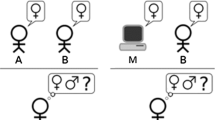Abstract
The linguistic, psychological, and social aspects of questions and question asking in verbal discourse are discussed. Classification taxonomies for question forms and functions are outlined. Research on the processes of question formation, question selection, and question asking is reviewed. Descriptive data for the occurence of question types in verbal discourse are presented. Suggestions are made concerning further descriptive and experimental approaches to the study of questions.
Similar content being viewed by others
References
Abelson, R. P., Aronson, E., McGuire, W. J., Newcomb, T. M., Rosenberg, M. J. and Tannenbaum, P. H. (eds.) (1968).Theories of Cognitivie Consistency: A Sourcebook, Rand McNally, Chicago.
Aqvist, L. (1965).A New Approach to the Logical Theory of Interrogatives, University of Uppsala, Uppsala.
Arbini, R. (1969). Tag questions and tag-imperatives in English.J. Ling. 5:205–214.
Bach, E. (1971). Questions.Ling. Inquiry 2:153–166.
Baker, C. L. (1968). Indirect questions in English. Ph.D. thesis, Department of Linguistics, University of Illinois.
Baker, C. L. (1970). Notes on the descriptions of English questions: The role of an abstract question morpheme.Found. Ling. 6:197–219.
Berlyne, D. E. (1960).Conflict, Arousal, and Curiosity, McGraw-Hill, New York.
Berlyne, D. E. (1965).Structure and Direction in Thinking, Wiley, New York.
Bernstein, B. B. (1962). Social class, linguistic codes and grammatical elements.Lang. Speech 5:221–240.
Brown, R. (1968). The development of Wh question in child speech.J. Verb. Learn. Verb. Behav. 7:279–290.
Chafe, W. L. (1972).Meaning and the Structure of Language, University of Chicago Press, Chicago, Chap. 19.
Chaudhari, U. S. (1974). The role of questions in thinking and learning from test: A research perspective.Educ. Technol. 14:7–11.
Cygan, J. (1967). On the exponents of question function in English.Lang. Learn. 17:141–149.
Davis, E. A. (1932). The form and function of children's questions.Child Dev. 3:57–74.
Fillenbaum, S. (1968). Recall for answers to “conducive” questions.Lang. Speech 11:46–53.
Fillembaum, S. (1971). Processing and recall of compatible and incompatible question and answer pairs.Lang. Speech 14:256–265.
Frantz, D. G. (1973). On question word movement.Ling. Inquiry 4:531–534.
Frase, L. T. (1968). Questions as aids to reading: Some research and a theory.Am. Educ. Res. J. 5:319–332.
Gregg, L. (1974).Knowledge and Cognition, Halstead Press, New York.
Hamblin, C. L. (1967). Questions. In Edwards, P. (ed.),Encyclopedia of Philosophy, Vol. 7, Macmillan, New York.
Hudson, R. A. (1975). The meaning of questions.Language 51:1–31.
Hunkins, F. B. (1972).Questioning Strategies and Techniques, Allyn and Bacon, Boston.
Issacs, N. (1930). Children's “why” questions. In Issacs, S. (ed.),Intellectual Growth in Young Children, Routledge, London.
Katz, H. A., Warrick, P., and Greenberg, M. H. (1974).Introductory Psychology Through Science Fiction, Rand McNally, Chicago.
Katz, J. J., and Postal, P. M. (1964).An Integrated Theory of Linguistic Universals, MIT Press.
Kearsley, G. P. (1975a). A simulation model of twenty questions. Center for Advanced Study in Theoretical Psychology Progress Paper 187A.
Kearsley, G. P. (1975b). Erotetic logic? Center for Advanced Study in Theoretical Psychology Progress Paper 194A.
Kearsley, G. P. (1975c). Question asking as cognitive modelling. Center for Advanced Study in Theoretical Psychology Progress Paper 205A.
Kochen, M., and Badre, A. N. (1974). Questions and shifts of representation in problem solving.Am. J. Psychol. 87:369–383.
Kohler, K. (1973). Phonetic and semantic aspects of “tag questions” in English.Ling. Ber. 24:35–42.
Koutsoudas, A. (1968). On wh-words in English.J. Ling. 4:267–273.
Kuno, S., and Robinson, J. J. (1972). Multiple who questions.Ling. Inquiry 3:463–487.
Langacker, R. W. (1970). English question intonation.Papers Ling. 1:139–161.
Lowental, U. (1972). On the use of questions in psychiatry.Comp. Psychiat. 13:19–23.
Malone, J. L. (1967). A transformational re-examination of English questions.Language 43:686–702.
Meyer, W. J., and Shane, J. (1973). The form and function of children's questions.J. Genet. Psychol. 123:285–296.
Michie, D. (1976).The Machine Representation of Knowledge, Reidel, Dordrecht-Holland.
Mishler, E. G. (1975). Studies in dialogue and discourse. II. Types of discourse initiated by and sustained through questions.J. Psycholing. Res. 4:99–121.
Moravcsik, E. A. (1971). Some cross-linguistic generalizations about yes-no questions and their answers.Stanford Univ. Working Papers Ling. 7:45–193.
Mosher, I. A., and Hornsby (1966). On asking questions. In Bruner, J., Olver, R. R., and Greenfield, P. M. (eds.),Studies in Cognitive Growth, Wiley, New York.
Piaget, J. (1928).The Language and Thought of the Child, Harcourt, Brace, New York.
Quirk, R., Greenbaum, S., Leech, G., and Svartvik, J. (1972).A Grammar of Contemporary English, Longman, London.
Rimoldi, H. J. A. (1971). Logical structure and languages in thinking processes.Int. J. Psychol. 6:65–77.
Robinson, W. P., and Rackstraw, S. J. (1972).A Question of Answers, Routledge and Kegan Paul, London.
Rosenthal, T. L., Zimmerman, B. J., and Durning, K. (1970). Observationally induced changes in children's interrogative classes.J. Personal. Soc. Psychol. 16:681–688.
Schank, R., and Colby, K. M. (1973).Computer Models of Thought and Language, Freeman, San Francisco.
Terry, R. M. (1970).Contemporary French Interrogative Structures, Cosmos, Sherbrooke, Quebec, Canada.
Watanabe, K. (1972). The intonation of wh-questions in English.Bull. Phonet. Soc. Jpn. 140:4–6.
Weeks, T. E. (1974).The Slow Development of a Bright Child, Lexington Books, Lexington, Mass.
Wright, P. (1972). Some observations on how people answer questions about sentences.J. Verb. Learn. Verb. Behav. 11:188–195.
Yamamoto, K. (1963). Development of the ability to ask questions under specific testing conditions.J. Gen. Psychol. 101:83–90.
Author information
Authors and Affiliations
Rights and permissions
About this article
Cite this article
Kearsley, G.P. Questions and question asking in verbal discourse: A cross-disciplinary review. J Psycholinguist Res 5, 355–375 (1976). https://doi.org/10.1007/BF01079934
Received:
Issue Date:
DOI: https://doi.org/10.1007/BF01079934




